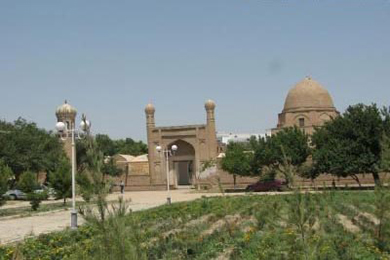Makhdumi Agzam — Makhdum-i Ajzam (a full name Said Jalal hell dynes Ahmad al-Kasani ad-Dakhbedi — Shaykh Aḥmad ibn Mawlgng Jalgl al-DMN Khwgjagm KGSGNM 'Makhdtsm-i A am', (1461 — 1542) — the Islamic theologian and the mystic from Central Asia, the representative of Sufism, the founder of Dakhbediya school, the large theorist and the sheikh of the doctrine of Naqshbandi.
Biography
Makhdumi Ajzam (Makhdum-i Ajzam) was born in 1461 in the city of Kasan (Kasansaysk district) (Fergana Valley), Uzbekistan. The family tree of Makhdumi Agzam goes back to the prophet Mahomed (sav). He is a descendant of the famous theologian and the figure of Sufism Burkhaniddin Kylycha]. Data on it are kept in such sources as Dzhomejul-makomat, "Ravoyikhul-kuds", "Tukhfatul-zojirin" Nassir hell dynes ibn Amir of Muzaffar, "Tazkirai azizon", Hidoyatnam. In youth Makhdumi Ajzam studied in the known then madrasah in Tashkent. It became myuridy the prominent follower of a nakshbandizm in Central Asia Hodzhi Akhrar. After Hodzhi Akhrar's death, he became Maulan Mahomed Kazi's pupil (mind. in 922 / 1516) which became the main support of nakshbandist and directed activity of an award of Naqshbandi. After Maulan Mahomed Kazi's death, Makhdumi Ajzam became the mentor of nakshbandist. Makhdumi Ajzam arrived from the Fergana region to Kashgar in 1533 (1534). Here he was engaged in active promotion of Islam and the doctrine of a nakshbandizm. As the author of the composition of "Tazkerei hodzhagan" ("The description of adventures of hajjs") Mahomed Sadyk of Kashgaria noted, Makhdumi Azam "was met by the people yours faithfully and received rich estates from the Kashgar khans". He returned to Central Asia and died in Samarkand in 1542.
Many famous people of the time, including governors, considered Makhdumi Ajzam the spiritual mentor. Among them there was Amir Timur's descendant (Tamerlan) the poet and governor Zakhiriddin Mahomed Babur. In "Tarija Rashidi" (author Mirza Mahomed Haidar) is records about Babur and Makhdumi Ajzam's svyaza. Makhdumi Ajzam wrote about Babur the work "Risolai Boburiya" at the initiative of one of large military figures Sheybanidov to Dzhanibek Sultan he Miyonkal (Entre Rios) — in 12 km from Samarkand in Dagbita (Akdaryinsky district) moves to the valley. And here remains until the end of the life, till 1542. According to medieval sources, after arrival on the new place Makhdumi Ajzam first of all put ten willows. (The word "dagbit", more precisely "дахбед" from Persian means "ten willows"). Later here he laid out a huge garden over 20 hectares. The farmer and the gardener, it conducted very modest life. It possesses a courageous, for those times, statement: "Not the person is created for religion, and religion for the person" Makhdumi Ajzam wrote in Persian Tajik more than 30 works in the field of philosophy, geology, the rights — part of them is united under the name "Mazhmua Ar-Rasoil".




